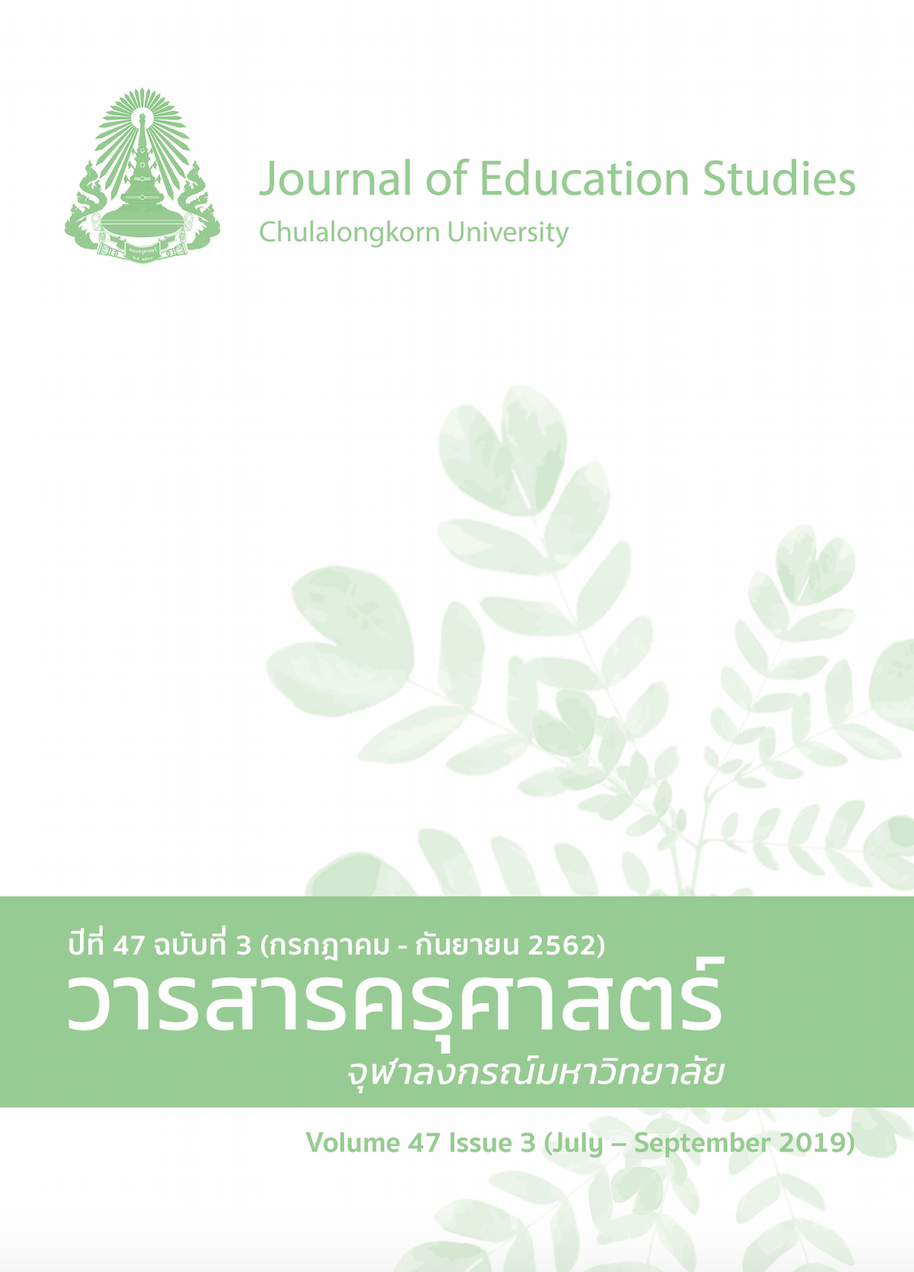Effects of Deductive Learning Method in Mobile Learning Environment on English Learning Achievement and Learning Motivation of 4th Grade Students with Different Learning Abilities
Keywords:
DEDUCTIVE LEARNING METHOD, MOBILE LEARNING, ENGLISH LEARNING ACHIEVEMENT, LEARNING MOTIVATIONAbstract
This experimental research aimed to 1) compare the English learning achievement of students who were taught by the deductive learning method in a mobile learning environment and students who were taught by a conventional learning method, 2) compare before and after of English learning achievement of students who were taught by deductive learning method in a mobile learning environment, 3) compare English learning achievement of students who were taught by the deductive learning method in a mobile learning environment with different learning abilities, 4) compose the motivation levels of students who were taught through mobile and conventional learning style, and 5) compose motivation levels of different ability groups who have been solely taught through the deductive mobile learning method. The samples were students in grade 4 at Chulalongkorn University Demonstration Elementary School. The research instrument consisted of 4 lesson plans, exercise in mobile learning environment, the English achievement test and learning motivation questionnaire. Data were analyzed using descriptive statistics, dependent sample t-test Independent sample t-test and one-ways ANOVA. The research findings were as follows: The experimental group had higher English learning achievement than the control group at statistically significant level 05. Moreover the student had English learning achievement before being taught by deductive learning method in mobile learning environment higher than after at statistically significant level .05. There were on statistically significant differences in terms of the mean of English learning achievement between student groups of different learning abilities at a statistically significant level .05. Overall, motivation levels of students from mobile and conventional learning methods showed no major difference beyond a significant level .05. Students of different ability levels who partook in the mobile learning method showed varying motivation within a significant level .05. Students in the higher ability group showed a greater level of motivation in comparison to the intermediate level group.
References
ภาษาไทย
โฆษิต จัตุรัสวัฒนากูล. (2557). ผลของการเรียนแบบร่วมมือโดยใช้เทคนิคการสอนเป็นกลุ่มที่ช่วยเหลือเป็นรายบุคคลที่มีต่อผลสัมฤทธิ์ทางการเรียน และความสามารถในการถ่ายโยงการเรียนรู้ในวิชาคณิตศาสตร์ของนักเรียนชั้นประถมศึกษาปีที่ 5 ที่มีระดับความสามารถต่างกัน (วิทยานิพนธ์ปริญญาดุษฎีบัณฑิต ไม่ได้ตีพิมพ์) จุฬาลงกรณ์มหาวิทยาลัย, กรุงเทพฯ.
จิตรลดา วิวัฒน์เจริญวงศ์. (2555). ผลของการใช้เทคนิคการทดสอบย่อยที่มีต่อผลสัมฤทธิ์ทางการเรียนของนักศึกษา. วารสารวิชาการศรีปทุม, 9(2), 34-46.
ชีวัน บุญตั๋น. (2546). การใช้กลวิธีการเรียนแบบเพื่อนช่วยเพื่อนเพื่อเพิ่มพูนความเข้าใจในการอ่านภาษาอังกฤษ และการมองเห็นคุณค่าในตนเองของนักเรียนชั้นมัธยมศึกษาปีที่ 4 (วิทยานิพนธ์ปริญญามหาบัณฑิต ไม่ได้ตีพิมพ์). มหาวิทยาลัยเชียงใหม่, เชียงใหม่.
ณรงค์ กาญจนะ. (2558). เทคนิคและทักษะการสอนเบื้องต้น (พิมพ์ครั้งที่ 2). สงขลา: โปรแกรมวิชาหลักสูตรและการจัดการเรียนรู้ คณะครุศาสตร์ มหาวิทยาลัยราชภัฎสงขลา.
ทวี สระน้ำคำ. (2551). ผลของวิธีสอนแบบนิรนัยและวิธีสอนแบบอุปนัยที่มีแบบฝึกหลังเรียนต่างกันโดยใช้บทเรียนบนเว็บในวิชาฟิสิกส์ที่มีต่อการคิดวิจารณญาณของนักเรียนมัธยมศึกษาปีที่ 4 (วิทยานิพนธ์ปริญญาดุษฎีบัณฑิต ไม่ได้ตีพิมพ์). จุฬาลงกรณ์มหาวิทยาลัย, กรุงเทพฯ.
ทิศนา แขมมณี. (2550). รูปแบบการเรียนการสอนทางเลือกที่หลากหลาย. กรุงเทพฯ: สำนักพิมพ์แห่งจุฬาลงกรณ์มหาวิทยาลัย.
ทิศนา แขมมณี. (2552). วิธีสอนสำหรับครูมืออาชีพ. กรุงเทพฯ: สำนักพิมพ์แห่งจุฬาลงกรณ์มหาวิทยาลัย.
นวพร วิชัย. (2556). ผลการใช้สื่อมัลติมีเดียที่มีการสรุปด้วยผังความคิดร่วมกับวิธีการสอนแบบอุปนัย-นิรนัย วิชาคอมพิวเตอร์ที่มีต่อผลสัมฤทธิ์ทางการเรียนของนักเรียนชั้นมัธยมศึกษาปีที่ 1 โรงเรียนอรุณประดิษฐ. Veridian E-Journal, 6(1), 707-718.
พูลศรี เวศย์อุฬาร. (2554). Augmented reality วิชาภาษาอังกฤษสำหรับนักเรียนชั้นประถมศึกษา โรงเรียนในสังกัดกรุงเทพมหานคร. สืบค้นจาก https://repository.au.edu
มโนพัศ มณีโชติ. (2554). การจัดการความรู้สำหรับเทคโนโลยีสารสนเทศ. สืบค้นจาก https://www.gotoknow.org/blog/manophat
ลิสตาติ สุกีมิน. (2554). การพัฒนารูปแบบการสอนเพื่อเสริมสร้างแรงจูงใจและผลสัมฤทธิ์ทางการเรียนรู้ตามแนวทฤษฎีความสามารถของตนเองและทฤษฎีพัฒนาการด้านการรู้คิดทางสังคมสำหรับนักเรียนประถมศึกษาตอนต้นในโรงเรียนนานาชาติในกรุงเทพมหานคร (วิทยานิพนธ์ปริญญาดุษฎีบัณฑิต ไม่ได้ตีพิมพ์) จุฬาลงกรณ์มหาวิทยาลัย, กรุงเทพฯ.
สถาบันทดสอบทางการศึกษาแห่งชาติ. (2560). โอเน็ตยังไม่กระเตื้องผลคะแนนเฉลี่ยไม่ถึงครึ่งทุกวิชา. สืบค้นจาก https://www.thaipost.net/main/detail/5833
สาคร บุตรจันทร์. (2554). การสอนแบบคละชั้น (โรงเรียนขนาดเล็ก). สืบค้นจาก https://www.dlit.ac.th/pages/plc/viewplc.php?lid=1&lname=&cid=04&subjectid=&gradeid=&plcid=000365&title=การสอนแบบคละชั้น%20 (โรงเรียนขนาดเล็ก)%20ผอ.สาคร%20บุตรจันทร์
สุกิจ ทวีศักดิ์. (2555). การพัฒนาคู่มือเสริมสร้างแรงจูงใจสำหรับนักเรียนมัธยมศึกษาที่ขาดแรงจูงใจ: การวิจัยแบบผสมวิธี (วิทยานิพนธ์ปริญญามหาบัณฑิต ไม่ได้ตีพิมพ์). จุฬาลงกรณ์มหาวิทยาลัย, กรุงเทพฯ.
อรศิริ เลิศกิตติสุข และ ดวงกมล ลิมโกมุท. (2552). การสอนแบบเพื่อนช่วยเพื่อน. เข้าถึงโดยhttps://www.thaigoodview.com/node/42182
ภาษาอังกฤษ
British Council. (2002). Deductive approach. Retrieved from https://www.teachingenglish.org.uk/article/deductive-approach
Gianfranco, C. (2015). The ten pillars of effective teaching and learning. Retrieved from https://www.linkedin.com/pulse/ten-pillars-effective-teaching-learning-gianfranco-conti-ph-d
Hied, J. (2005). Inductive and deductive grammar teaching: What is it?, and does it work?. Retrieved from https://oupeltglobalblog.com/2015/04/24/inductive-and-deductive-grammar-teaching/
Pintrich, P. R. (2003). A motivational science perspective on the role of student motivation in learning and teaching contexts. Journal of educational Psychology, 95(4), 667-686.
Zhao, L. (2012). Investigation into motivation types and influences on motivation: The case of Chinese non-English majors. English language teaching, 5(3), 100-19.




